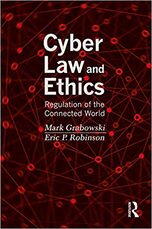
The book, which Grabowski uses in the Cyber Law & Ethics course he teaches, provides an overview of legal, policy and ethical issues raised by our use of cyberspace and information technology. Some of the topics addressed include social media, online privacy, artificial intelligence, cybercrime, intellectual property, online gaming and internet governance. The book also covers trending issues such as deplatforming, catfishing, doxing, ransomware, revenge porn, data mining, drones, cybernetics and disinformation.
“With a growing list of varied colleges now offering undergraduate courses devoted to this topic, we believe this book fills an important void in the field of study,” Grabowski told tech blog InnovateLI. “Legal issues relating to cyberspace and technology are becoming more and more important to everyday people as the world becomes more connected.”
The book has received rave reviews so far. It's listed among the "Best New Technology Books" by BookAuthority.
Kyu Ho Youm, Jonathan Marshall First Amendment Chair at University of Oregon, also gave a positive review of the book: “Searching for a timely and comprehensive book on cyber law? If so, Cyber Law & Ethics should be for you. For this book is for anyone interested in all the major legal and ethical cyber issues, including freedom of online speech, privacy, IP and gaming. Also covered are a number of evolving and emerging topics such as AI, cyborgs and drones. Although it centers on U.S. law, the book is refreshingly global. Mark Grabowski and Eric Robinson pay discerning attention to international and comparative law. What a remarkable contribution to understanding cyber law.”

 RSS Feed
RSS Feed